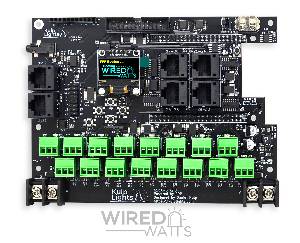
The
K16A-B by Kulp Lights is a
Beaglebone based controller that runs on FPP. It has sixteen local string ports and four on-board differential chains. Each chain can be used to run between one and six
differential boards depending on the version of FPP and hardware. There are two expansion ports on this controller. One port is dedicated to adding an
FM transmitter. The second expansion port allows for the addition of a single pixel expansion board, either a
differential or
string expansion. The
string expansion will give you sixteen additional local ports while the
differential expansion will afford another four
receiver chains.
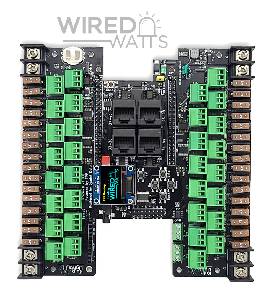
The
K32A-B by Kulp Lights is a
Beaglebone based controller that runs on FPP. It has 32 local string ports and four on-board differential chains. Each chain can be used to run between one and six
differential boards depending on the version of FPP and hardware. There is a single expansion port on this board that will allow for the addition of an
FM transmitter.
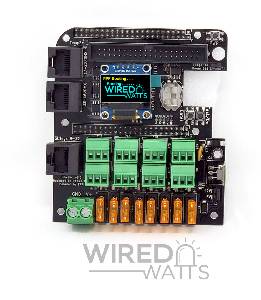
The
K8-B by Kulp Lights is a
Beaglebone based controller that runs on FPP. It has eight local string ports and three on-board differential chains. Each chain can be used to run between one and six
differential boards depending on the version of FPP and hardware. There is an expansion port that allows the addition of a single expansion board, either a
differential or
string expansion. The
string expansion will give you sixteen additional local ports while the
differential expansion will afford another four
receiver chains.
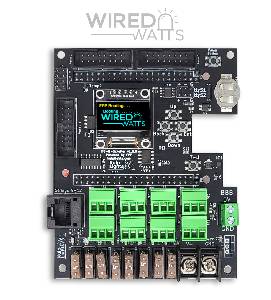
The
K8-B Scroller by Kulp Lights is a
Beaglebone based controller that runs on FPP. It has eight local string ports and one on-board differential chain. Each chain can be used to run between one and six
differential boards depending on the version of FPP and hardware. There is no further expansion capability on this board.
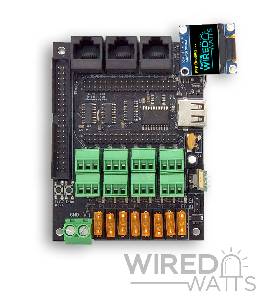
The
K8-PB by Kulp Lights is a
Pocket Beagle based controller that runs on FPP. It has eight local string ports and three on-board differential chains. Each chain can be used to run between one and six
differential boards depending on the version of FPP and hardware. There is an expansion port that allows the addition of a single expansion board, either a
differential or
string expansion. The
string expansion will give you sixteen additional local ports while the
differential expansion will afford another four
receiver chains.
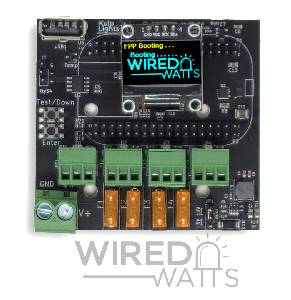
The
K4-PB by Kulp Lights is a
Pocket Beagle based controller that runs on FPP. It has four local string ports and no expansion capability.
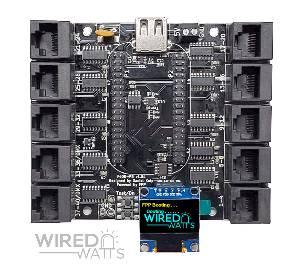
The
K40D-PB by Kulp Lights is a
Pocket Beagle based controller that runs on FPP. It has no local string ports and ten on-board differential chains. Each chain can be used to run between one and six
differential boards depending on the version of FPP and hardware. There is no further expansion capability on this board.
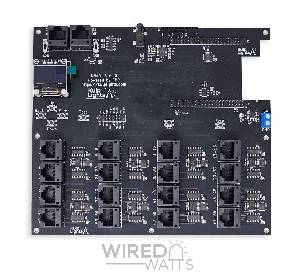
The
K64D-B by Kulp Lights is a
Beaglebone based controller that runs on FPP. It has no local string ports and 16 on-board differential chains. Each chain can be used to run between one and six
differential boards depending on the version of FPP and hardware. There is no further expansion capability on this board.
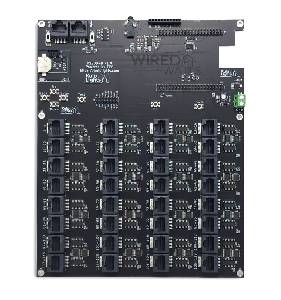
The
K128D-B by Kulp Lights is a
Beaglebone based controller that runs on FPP. It has no local string ports and 32 on-board differential chains. Each chain can be used to run between one and six
differential boards depending on the version of FPP and hardware. There is no further expansion capability on this board.
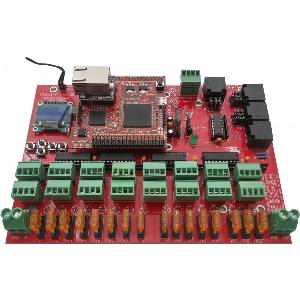
The F16v2 (Blue / Red) by
Pixelcontroller.com is an embedded style controller running proprietary firmware. It has sixteen local string ports and one on-board differential port. The differential port can be used to run one
differential board in "dumb" mode. There is a single expansion port on this board that will allow for the addition of a single pixel expansion board, either a
differential or
string expansion. The
string expansion will give you sixteen additional local ports while the
differential expansion will afford another four "dumb"
receiver ports.
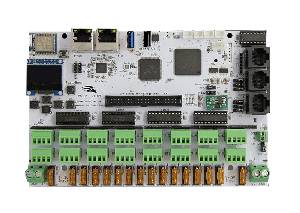
The F16v3 (White) by
Pixelcontroller.com is an embedded style controller running proprietary firmware. It has sixteen local string ports and one on-board differential port. The differential port can be used to run between one and three
differential boards depending on the firmware and hardware. There is a single expansion port on this board that will allow for the addition of two pixel expansion boards, either a
differential or
string expansion. The
string expansion will give you sixteen additional local ports while the
differential expansion will afford another four
receiver ports.
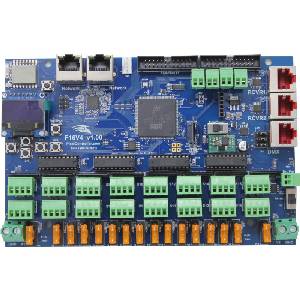
The F16v4 (Blue) by
Pixelcontroller.com is an embedded style controller running proprietary firmware. It has sixteen local string ports and three on-board differential ports. The differential ports can be used to run between one and six
differential boards depending on the hardware. There are two expansion ports on this board that will allow for the addition of two pixel expansion boards, one on each port, either a differential or string expansion. The string expansion will give you sixteen additional local ports while the differential expansion will afford another four
receiver ports.

The F16v5 (Blue) by
Pixelcontroller.com is an embedded style controller running proprietary firmware. It has sixteen local string ports and three on-board differential ports. The differential ports can be used to run between one and six
differential boards depending on the hardware. There are two expansion ports on this board that will allow for the addition of two pixel expansion boards, one on each port, either a differential or string expansion. The string expansion will give you sixteen additional local ports while the differential expansion will afford another four
receiver ports.
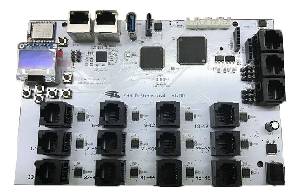
The F48v1 (White) by
Pixelcontroller.com is an embedded style controller running proprietary firmware. It has no local string ports and twelve on-board differential ports. The differential ports can be used to run between one and three
differential boards depending on the firmware and hardware. There is no further expansion capability on this board.
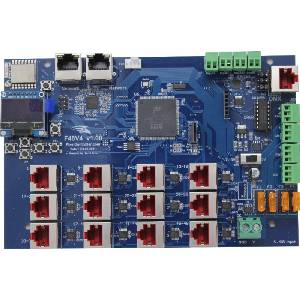
The F48v4 (Blue) by
Pixelcontroller.com is an embedded style controller running proprietary firmware. It has four local string ports and twelve on-board differential ports. The differential ports can be used to run between one and six
differential boards depending on the hardware. There is no further expansion capability on this board.
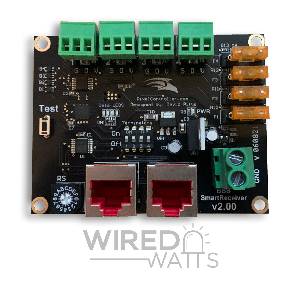
The Falcon SRx1 is an expansion board that uses the Falcon receiver protocol. It has four local string ports and no differential ports. There is no further expansion capability on this board.
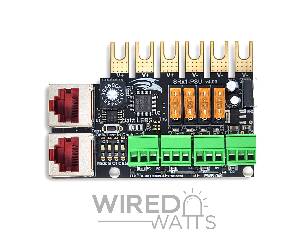
The Falcon Smart Receiver board (SRx1-PSU) is an expansion board that uses the Falcon receiver protocol. It has four local string ports and no differential ports. There is no further expansion capability on this board.
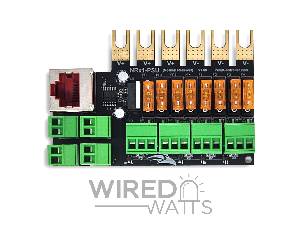
The Falcon Receiver board (NRx1-PSU) is an expansion board that uses the Falcon receiver protocol. It has four local string ports and no differential ports. There is no further expansion capability on this board.
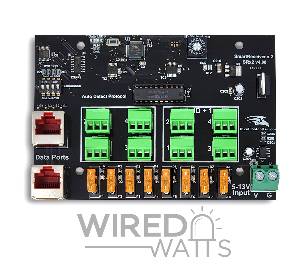
The Falcon SRx2 is an expansion board that uses the Falcon receiver protocol. It has eight local string ports and no differential ports. There is no further expansion capability on this board.
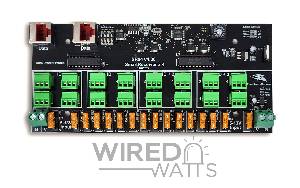
The Falcon SRx4 is an expansion board that uses the Falcon receiver protocol. It has 16 local string ports and no differential ports. There is no further expansion capability on this board.
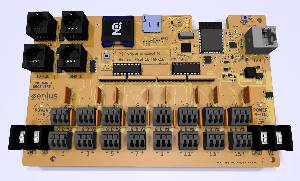
The GPX16 by
ExperienceLights.com is an embedded style controller running proprietary firmware. It has sixteen local string ports.
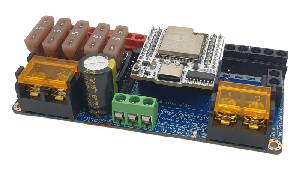
The Dig-Quad is an Arduino based board by QuinLED running WLED firmware. It has four local string ports and no differential ports. There is no further expansion capability on this board.
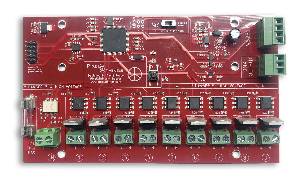
The Pixel2Things AC is an embedded AC style board with no further expansion. It uses three pixels worth of data to ramp / dim nine AC channels.